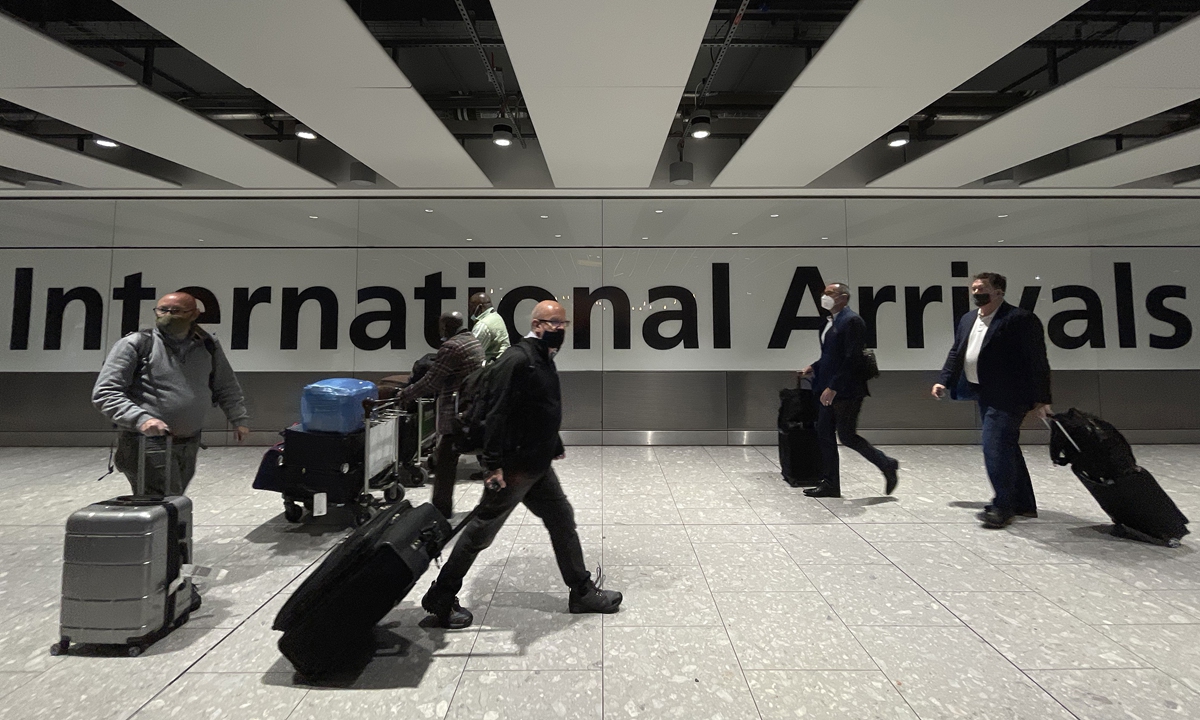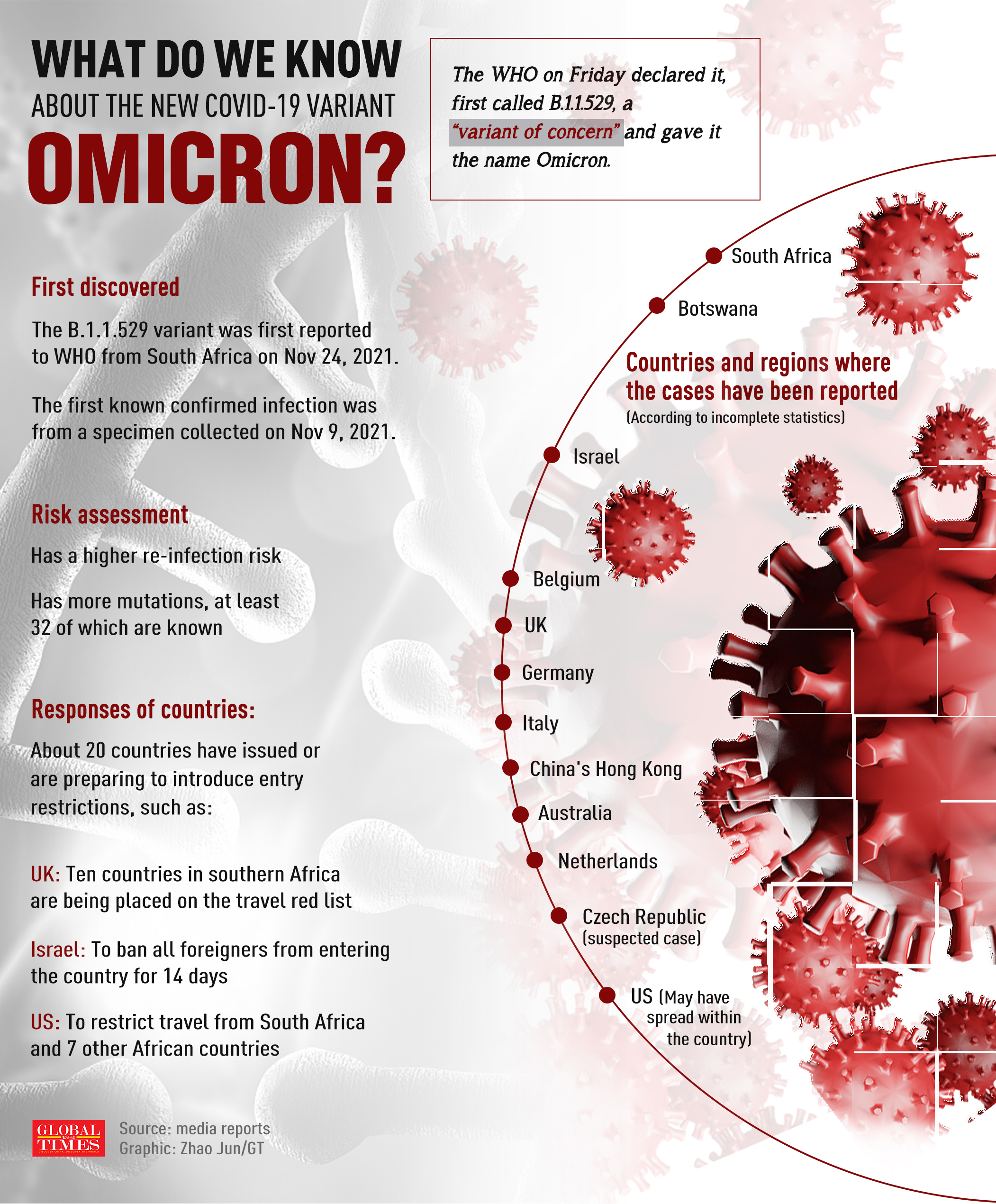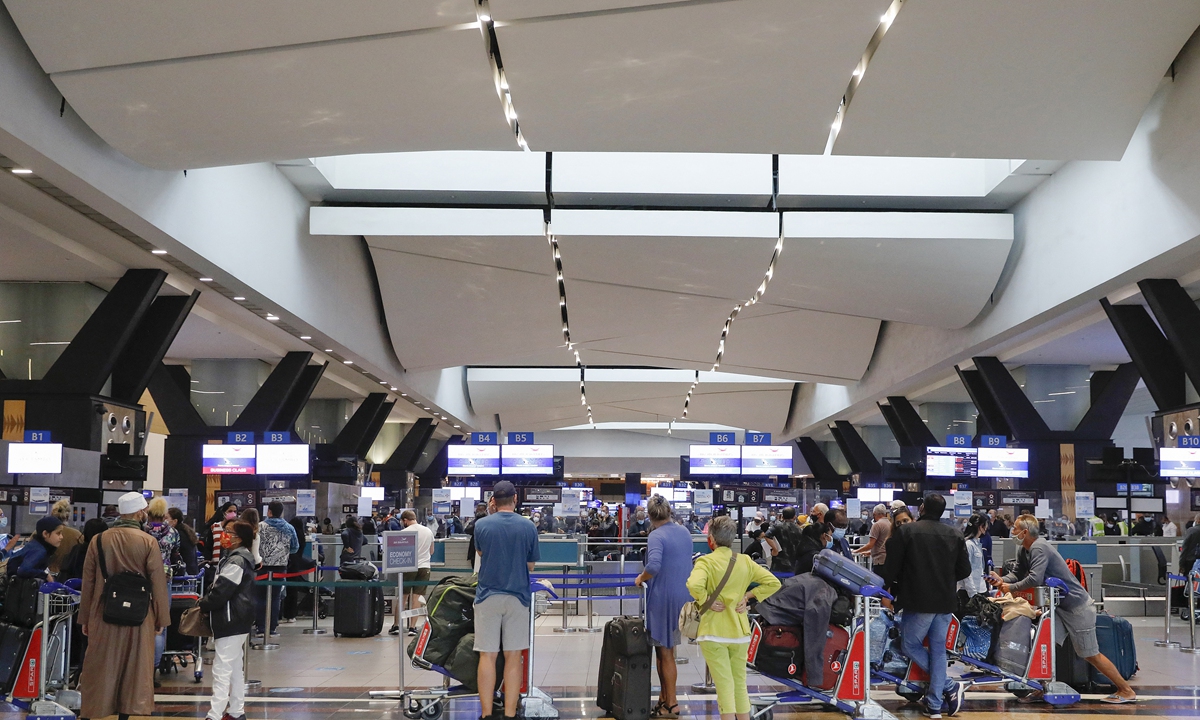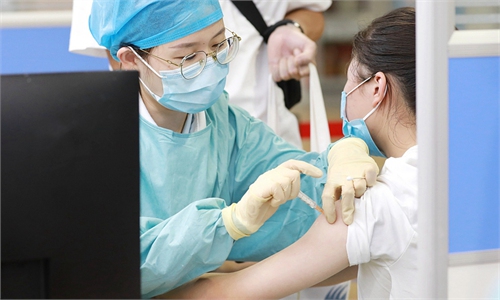World on high alert over Omicron variant
Dynamic zero-COVID policy gives China benefit of coping any mutation: epidemiologist

International passengers walk through the arrivals area at Heathrow Airport on November 26, 2021 in London, England. UK Health Secretary Sajid Javid said starting noon on November 26, all flights from South Africa, Namibia, Zimbabwe, Botswana, Lesotho and Eswatini will be suspended and the countries are added to the travel Red List after the detection of a new COVID-19 virus variant in some African countries. Photo: VCG
Just as some parts of the world have been poised for living with the COVID-19 virus with relaxed epidemic prevention restrictions and re-opened borders, the Omicron variant has brought the process to a juddering halt.
While many countries began ramping up efforts to shut out the new mutation, potentially more transmissible than the currently prevailing Delta variant, leading Chinese epidemiologists brushed aside the possibility that Omicron will have a major impact on China, pointing to the country's current dynamic zero-COVID model and swift response to flare-ups that ensure the country is able to deal with any variant.
The new mutation, declared by the World Health Organization as a "variant of concern," was discovered in South Africa and has since been detected in countries and regions such as Australia, UK, Germany, Israel, Italy, the Czech Republic and China's Hong Kong.

What do we know about the new COVID-19 variant Omicron? Graphic: GT
Despite having one of the world's highest COVID-19 vaccination rates, Israel was the first country to ban foreigners from entering in response to the new variant. Countries such as the UK, and some other EU countries and the US have imposed travel bans on South Africa and neighboring countries.
The new variant has been driving a jump in infections in South Africa. Yet the Global Times reporter found that people in Johannesburg, the largest city in South Africa, remain calm, and the new variant is not causing fear. Many people still flocked to shopping malls during the weekend as shops offered discounts for the Black Friday shopping spree.
South African President Cyril Ramaphosa met with the Ministerial Advisory Committee on Saturday which could mean a move to a higher or adjusted lockdown level, local media reported on Saturday.
The Chinese embassy in South Africa issued a warning on Sunday, urging Chinese nationals in the country to protect themselves, avoid unnecessary travel and get vaccinated as soon as possible.
Benefit of tight control
In face of the unknown danger of Omicron, Chinese pharmaceutical companies are ramping up efforts to detect the virus and tweak current vaccines, while Chinese epidemiologists are confident the mutation will not have a major impact on China at the current stage.
Hong Kong Special Administrative Region, which has reported two cases of the new variant, has already banned entry of non-Hong Kong residents who have been in eight African countries, including South Africa, Botswana, Lesotho, Mozambique and Malawi, within 21 days of arrival.
Health authorities in Macao, where travel restrictions with the Chinese mainland have been eased, ordered on Sunday that cold-chain products imported from South Africa will be examined one by one.
One of China's major vaccine producers Sinovac Biotech told the Global Times on Saturday that the company is paying close attention to Omicron and has tapped into a global partner network to collect and obtain information and samples specific to the mutant virus.
Sinovac said they will study the variant's influence on its inactivated vaccine and the evaluate the need to develop a special vaccine against Omicron as soon as possible.
Chinese vaccine producer CanSino told the Global Times on Sunday that the company has started working on vaccines against the new variant. "Based on the advantage of recombinant adenovirus vector and mRNA technology, once the effect of the current vaccine is reduced, the company is confident it can develop a new vaccine targeting the new mutations in the shortest time."
Some Chinese bio-tech companies said their nucleic acid testing kits are upgraded and they are able to detect all prevailing variants, be it Delta, Gamma, Beta or Omicron.
Jin Dongyan, a biomedical professor at the University of Hong Kong, told the Global Times that most variants of coronavirus do not last long. Many of the new variants do not survive, and even if they survive, only a few become predominant variants.
Hundreds of COVID-19 variants have emerged since the outbreak began and only Delta survived, outpacing the Beta and Gamma variants, which have disappeared, Jin said. He added that it is unknown whether Omicron will become a predominant variant, and urged the public not to be too worried.
Writing on Sina Weibo on Sunday, Zhang Wenhong, head of the Shanghai COVID-19 medical team, said that China is now well-placed within the "strategic opportunity" period, which has been won by its dynamic zero-case strategy. The country is constructing the necessary scientific support for the next stage of regular epidemic prevention and control, and ensure the availability of vaccines and medication to enable the opening of borders globally. "If we can cope with the Delta variant, we can also cope with Omicron," Zhang said.
Zhang said that it is hard to tell yet that the global effort to fight the coronavirus has been wasted, and that two weeks of observance and more data are needed to make a precise judgment of the new variant.
Echoing Zhang, chief epidemiologist of the Chinese Center for Disease Control and Prevention (CDC) Wu Zunyou said on a Sunday conference that China's current COVID-19 policy is the country's "magic weapon," and is used effectively. Sticking to zero-tolerance means the Omicron variant is unlikely to prevail in China.
When asked about the relaxation of entry policies, Wu said that currently the vaccination rate has not reached the required herd immunity level so more data and analysis of booster shots are needed to judge the situation. "It's premature to talk about any adjustment," he said.
He also warned that the situation of COVID-19 is complicated, which allows no "disruptive mistakes." If an incorrect strategy is made, the impact could be huge.
Speaking at a Saturday conference, Chinese top respiratory expert Zhong Nanshan warned the new variant may cause more challenges to the work of epidemic prevention and control, but now is not the time to take drastic action.

Travelers line up at a check-in counter at OR Tambo International Airport in Johannesburg on November 27, 2021, after several countries banned flights from South Africa following the discovery of a new COVID-19 variant Omicron. Photo: VCG
Equally vulnerable
The emergence of a new mutation in the least vaccinated part of the world has triggered renewed debate about the imbalanced vaccine distribution, as scientists believe that Africa is bearing the brunt of panicked policies from Western countries which have failed to deliver promised vaccines and the resources needed to administer them.
Only about 24 percent of South Africans are fully vaccinated, according to Johns Hopkins University data, compared with nearly 60 percent of US residents and 76.8 percent in China.
The new mutation should teach developed countries a lesson that hoarding vaccines is both dangerous and stupid when it comes to the international effort to combat COVID-19, a Beijing-based immunologist told the Global Times on condition of anonymity.
When the virus propagates, duplicates and mutates in low-vaccinated countries, the virus is likely to evolve into a more dangerous variant, he said.
The Guardian quoted scientists who said that the unusual constellation of mutations of Omicron suggests it may have emerged during a chronic infection of an immunocompromised person, such as an untreated HIV/Aids patient.
Hoarding vaccines is also foolish, as the vaccines could be rendered useless if there are rapid mutations of the virus, said the anonymous immunologist who warned that protecting all countries is key in the global fight against coronavirus. "Even if Omicron doesn't prove very dangerous, even if one country is left behind in the battle against COVID-19, the whole world will be equally vulnerable to the next unknown danger."


